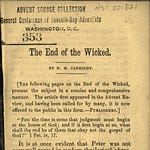The word “Easter” is derived from Ostera, the name of an Anglo-Saxon pagan goddess. She received special homage in the spring, as nature began to revive or seemed to be rising into life. The transition from a season of bleak winds, cold rains, and hurricanes, which had produced depression of soul, to a season of promise and hope of better things, was an occasion of joy, especially with so demonstrative and emotional a people as the orientals are. We know how hopeful and joyous we feel in the spring. The festival of Easter, therefore, was the most joyous in the year.
Among the many customs incident to it, one only now interests us, namely, that of exchanging and engaging in sport with eggs, the symbols of the revivication and the origin of nature, decorated in all imaginable ways. Hence the Easter egg. Such, briefly considered, was the pagan festival of Easter, which, in later and post-apostolic times, was given a Christian semblance.
That the word “Easter” occurs in [the Book of] Acts does not militate against this view for it and the presence of such expressions as “town clerk,” “robbers of churches,” etc., betray the inconsistency of the translators (A.D. 1611), who, for the Greek, selected English equivalents from expressions in current use, rather than give a true rendering. “Passover” rather than “Easter” is proper, as it appears in other places.
This festival had taken such deep root among our ancestors, the Anglo-Saxons, that when, in the fifth century, they were Christianized, it could not be eradicated. Rather than not gain them as converts, a compromise was effected. To conciliate these pagans, and yet not to offend the Christians, the old feast was allowed to remain, but was given a Christian aspect. The Jewish Passover, and the commemoration of Christ's resurrection, occurred also in the spring, about the time of the festival of Ostera, or Easter.
Our Lord's resurrection was sentimentally represented as the beginning of a new creation, the springtime in the spiritual realm, the Easter, as it were, of Christendom, the spiritual world, as the festival of Ostera was to pagandom and the natural world. Between the resurrection and the revivication of nature, between the risen Lord and the rising sun, a sentimental analogy was set up which soon gained acceptance, for, while it was fanciful, it was, to an extent, beautiful and inspiring, especially to the oriental mind. In the process of time the heathen aspect of the feast became absorbed by the Christian, and today the Easter festival exists in Christiandom from such an origin and compromise. Not only this pagan element, but, what concerns us more particularly, a Romish element is inherent in this Easter festival as we now have it.
Easter—Is It Scriptural?
No one will deny, but that Easter is a great institution, and great institutions must have firm foundations. The Protestant must look for such in the Bible. But so far is the Bible from giving any authority for its observance, that the following challenge of Archbishop Gibbons, “Read the Bible from Genesis to Revelation, and you will not find a single line authorizing the sanctification of Sunday” (Faith of Our Fathers, page 108), applies with equal force to Easter.
Not only is there no command, by nothing less than which can so great an institution be justified, but there positively is not the slightest hint, nor the slightest encouragement, by practice and example, anywhere to be found for the commemoration of any Biblical event by means of a day, save the Creator's rest from his labors. The Acts of the Apostles contains the history of the church from its beginning until about the year 65 or 70.
Throughout this entire history there is not to be found the slightest trace of the commemoration either of the death or resurrection of our Lord, save by the two ordinances, baptism and the Lord's supper. What the intention of our Lord was in instituting these two ordinances, it might be well for Protestants to think of in this connection, and in the light of apostolic example and teaching.
Perhaps the necessity of commemorating Christ's death and resurrection by means of days and feasts is caused by a sense of the evident fitness of such commemoration but we should “not be wise above that which is written,” by setting up feasts and days, a practice which received divine disapprobation in Old Testament times, and into which those very persons are retrograding who endeavor to exalt the new dispensation by gratuitously, unwarrantedly, and unnecessarily disparaging the old. The necessity of commemorating these events by days would not exist were they still commemorated by the only New Testament means, namely, the ordinances.
In view, therefore, of the silence of Scripture concerning such a commemoration by means of a day or festival, in view of the forced and unnatural interpretations placed on certain texts to support it, the answer of Scripture, like that of history, is that Easter observance is not consistently Protestant.
There are many whose zeal for existing forms is willfully not according to their knowledge of Scripture and of history, to both of which they lend a deaf ear, so as not to be disturbed in their usages. So long as the dignity of a system is maintained, what matters it if the Bible suffer violence, and history offers instruction in vain.
—Henry B. Maurer.











Share this post